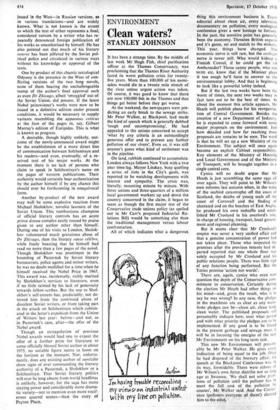ENVIRONMENT
Clean waters?
STANLEY JOHNSON
It has been a strange time. By the middle of last week Mr Hugh Fish, chief purification officer at the Thames Conservancy, was proclaiming that the 'Thames River Authority faced its worst pollution crisis for twenty- five years. More than 100,000 of his name- sakes would die in a twenty mile stretch of the river unless urgent action was taken. Of course, it was good to know that there are now 100,000 fish in the Thames and that things get better before they get worse.
At the weekend, the newspapers were pre- dicting an early break to the sewage strike. Mr Peter Walker, at Blackpool, had made the kind of speech which is generally dubbed 'tough and uncompromising'. He had appealed to the unions concerned to, accept 'what by any criteria is an outstandingly generous offer and to prevent any further pollution of our rivers'. Even so, it was still anyone's guess what kind of settlement was in the pipeline.
On land, rubbish continued to accumulate. London always follows New York with a two year time-lag. Mayor Lindsay, busy quelling a series of riots in the City's gaols, was reported to be watching developments with- interest and sympathy. The crisis was, literally, mounting minute by minute. With three unions and three-quarters of a million local government workers up and down the country concerned in the claim, it began to seem as though the first major test of the Conservative trade unions policy (as spelled out in. Mr Carr's proposed Industrial Re- lations Bill) would be something else than the traditional management versus labour confrontation.
All of which indicates what a dangerous rn.liosiss treat reconciling - my views, on inausWied Loral- wit-14 my Iowa) pollu,kon. thing this environment business is. Every editorial about clean air, every television documentary on pollution, every ecological conference gives a new hostage to fortune. In the past, the sensitive point has generally been the economy. Threaten British exports and it's game, set and match to the strikers. This year, things have changed. The economic nerve is still raw, but the ecologic nerve is rawer still. Who would kidnap a Finnish Consul, if he could get the us Ambassador? Those canny people, who run NUPE etc, know that if the Minister plays it too tough he'll have to answer to the environmental lobby. And that is beginning to look like a powerful lobby indeed.
But if the last two weeks have been the worst of times, the next two weeks may in fact turn out to be the best of times. At about the moment this article appears, Mr Heath will publish plans for his reorganisa- tion of Central Government. Besides the creation of a new Department of Industry, he is expected to come forward- with some major proposals on the environment. Just how detailed and how far reaching these proposals are remains to be seen. The word is that he will set up a new Ministry of the Environment. The subject will once again become an explicit Cabinet responsibility. Key elements of the Ministry of Housing and Local Government and of the Ministry of Transport, will be brought together in a single central core.
Cynics will no doubt argue that Mr Heath is just scrambling the same eggs all over again. They will point to Mi Wilson's own reforms last autumn when, in the wake of the seabird catastrophe off the coast of Scotland, the deaths of young seals off the coast of Cornwall and the finding of ulcerated cod on the beaches of East Anglia, he produced his own reshuffle and estab- lished Mr Crosland in his overlord's role, in charge of housing, transport, local govern- ment and regional .planning.
But it seems clear that Mr Crosland's empire was never a very unified affair and that a genuine concentration of power had not taken place. Those who inspected the premises after the previous tenants had de- parted reported that one whole floor was solely occupied by Mr Crosland and his public relations people. There was little sign of any function being performed. But the Tories promise 'action not words'.
There are, again, cynics who even now question the depth of the Conservative com- mitment to conservation. Certainly during the election Mr Heath had other things on his mind—and, given the result, who is to say he was wrong? In any case, the pledges in the manifesto are as clear as any mani- festo pledges can be—clean air, clean land, clean water. The published proposals will presumably indicate how, over what period and with what priority the pledges are to be implemented. If any good is to be found in the present garbage and sewage mess, it will be in focusing the energies of the new Mr Environment on his long term task.
This new Mr Environment will presum- ably be Mr Peter Walker. He gives every indication of being equal to the job. Once he had disposed of the brewery affair, his speech at the Blackpool Conference was, in its way, formidable. There were echoes of Mr Wilson's own fierce diatribe not so long ago at Swansea. 'We shall not solve prob- lems of pollution until the polluter has to meet the full cost of the pollution he creates', Mr Walker said. And the Confer- ence (polluters everyone of them!) cheered him to the echo,






































 Previous page
Previous page